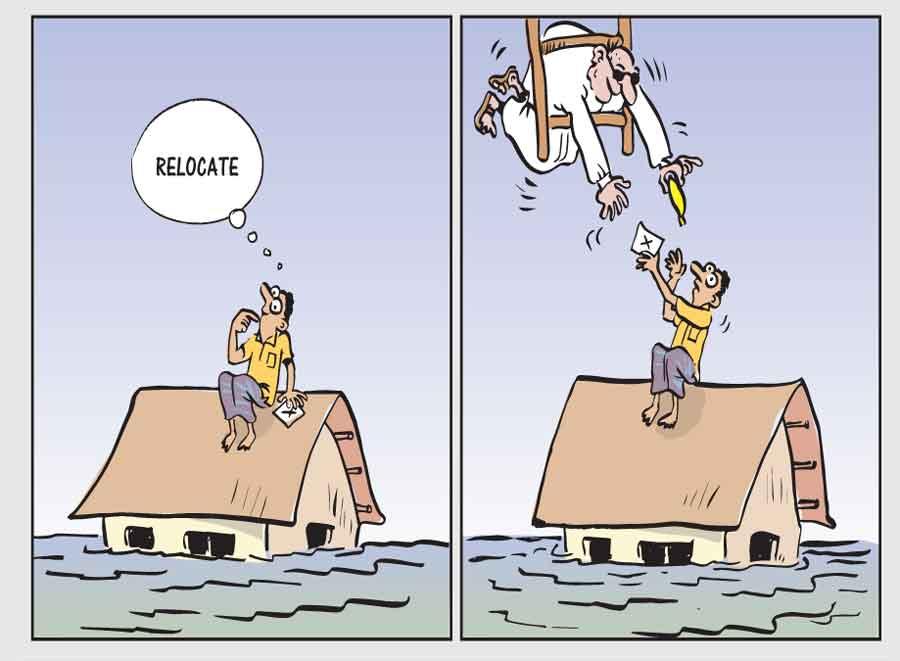Reply To:
Name - Reply Comment

The heavy rains and strong winds lashing Sri Lanka over the past few days have left us thinking deep and forced us to make our own analysis about adverse weather and how people respond to such calamities.
The stories about severe floods and the numbers displaced make us more depressed than the wet weather. In this depressed state of mind, we fail to see the politicians at work; who attend to their rounds with the aim of garnering support for political campaigns. In this environment we fail to see that generation after generation, especially
=insome of the most vulnerable areas to flooding- people failing to come out of poverty and relocate elsewhere. The President has instructed government authorities to provide immediate relief and services to those affected and to rely on information received from the site, as opposed to information obtained using technology. This move by the President must be lauded.
The security forces at work cannot be forgotten for the efforts they put in during floods of this nature. We don’t always need a war to realise that the men in uniform are there to defend Sri Lankans during the worst of challenges. But when the floods recede and life returns to normalcy, we must reflect on the memories of rising waters and accounts of displaced citizens. Could we have survived better during such floods?
We have heard over the past where some of our greedy lawmakers have encroached lands belonging to helpless citizens. Sometimes they have taken over even lands belonging to the state (These lands are legally known as crown lands). Some of these lands can be given to the less fortunate to build houses. If this is done, the such people, who have a history of dealing with floods, could see their living conditions elevated to a level that guarantees safety and also an increase in the quality of living.
One of the main reasons for floods is the destruction of mangroves, which absorb water during heavy rains. We have seen enough examples of people exploiting the environment and paying a heavy price for that. Time and time again we have read in newspapers about waste items being released to rivers and streams. Here the culprits have been factory owners. There was a culture in the past where people who wielded authority and had connections with politicians gave scant respect to doing environment assessment tests. They proceeded in building their ‘dream’ restaurants and businesses in buffer zones. The day of judgment often comes when the environment cannot take the beating it receives from unlawful human activities and eventually retaliates.
Armour Street in Colombo 12 is notorious for being inundated for the slightest down pour. We scribes make a great effort to find pictures of places inundated in such areas and publish them in our newspapers. The hard work of photographers is cherished when a great capture is made on ‘reel’ when all around us is under water. There was a time when much investigation done on why Armour Street reacts so adversely to rain revealed that the reason relates to most of the drains in the area being blocked by used and discarded plastic shopping bags. When there is a human hand at work creating floods or any disaster, forgiveness isn’t offered so easily.
Flood related stories have brought tears to our eyes and ‘moved’ even the bravest of hearts. But this time around it was unbearable to hear the news that some of the papers of the ongoing GCE Advanced Level Examination had to be postponed due to the prevailing flood condition. Children are our future and it’s about time that the damage done by floods within this ‘little’ island are kept under control. If the geography of children ought to be changed for the sake of the present generation it must be done, regardless of however challenging it is. That responsibility cannot be passed on from one generation to the next!